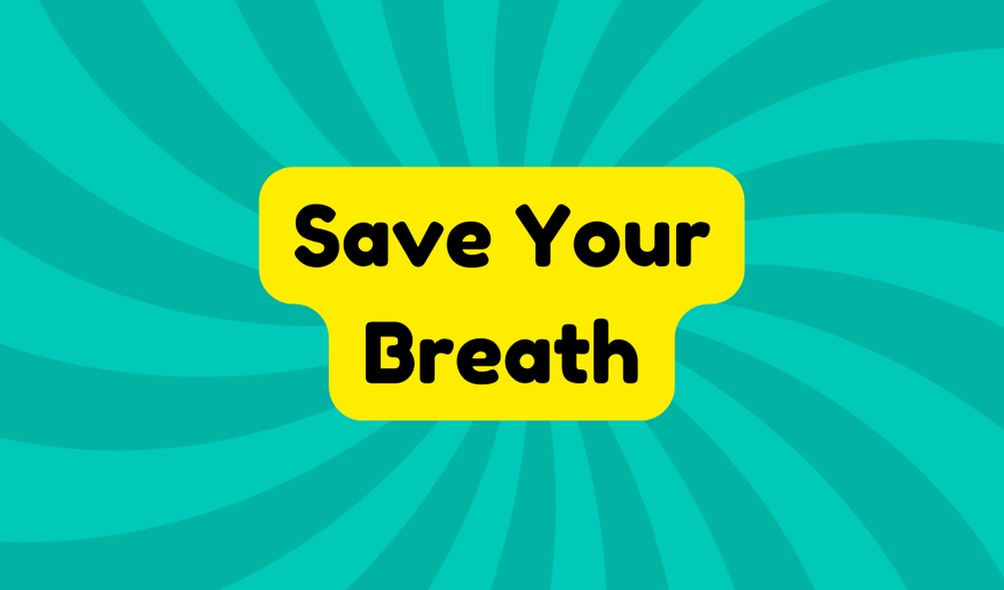"Save your breath" is an expression urging individuals to refrain from wasting energy on pointless conversations. This phrase reflects a common experience where talking to unresponsive people leads to frustration. It encourages prioritizing meaningful dialogue rather than futile disputes. Today, with technology and generational divides, effective communication often suffers. Recognizing when to hold one's tongue can be vital to fostering understanding. Exploring this concept further reveals insights into the importance of valuable interactions in our daily lives.
Synonyms
A variety of synonyms can capture the essence of the phrase "save your breath," each reflecting the concept of avoiding futile communication. These alternatives highlight the importance of recognizing wasted efforts in conversation. Innovation stems from knowing when to engage meaningfully and when to hold back.
- Conserve your energy
- Spare your words
- Save your talk
- Hold your tongue
- Bypass the chatter
Example of Sentences
Effective communication often requires a keen awareness of when to engage and when to hold back. In numerous situations, preserving one's breath becomes essential, particularly when faced with ineffective communication and futile arguments. Here are illustrative sentences that capture this concept:
- Asking teens to mute their phones often yields silence in response.
- Encouraging Sara to reflect on corporate jobs is a lost cause.
- Negotiating with the businessman about his old house serves no purpose.
- Debating with closed-minded individuals results in circular disputes.
- Discussing detention with unsympathetic parents achieves nothing.
These examples highlight the wisdom in knowing when to conserve energy for impactful dialogues.
Origin
The origins of the phrase "save your breath" remain largely shrouded in mystery, inviting curiosity among language enthusiasts. Despite its pervasive use, the historical context reveals a gap in documented etymology, leaving scholars speculating about its inception. Various cultures may have employed similar expressions, each emphasizing the futility of unproductive speech. However, the cultural significance is often overlooked; this idiom speaks to the universal human experience of engaging in ineffective communication. Ultimately, without extensive research and exploration, the true roots and implications of "save your breath" remain elusive, leaving an intriguing void for those intrigued by idiomatic expressions.
Collocations
Collocations related to the phrase "save your breath" illustrate the contexts in which this idiom often appears. These phrases are useful for understanding communication barriers and recognizing wasted efforts in conversations where outcomes seem futile.
- Save your breath for impactful moments
- Avoid wasting breath on unresponsive listeners
- Save your breath in futile discussions
- Don't waste breath on stubborn individuals
- Conserve breath for meaningful communication
In such scenarios, it becomes vital to identify when continued dialogue leads to frustration rather than progress, thereby allowing for more strategic and effective interactions in personal and professional spheres.
How to Use in Everyday Language
When individuals find themselves in discussions that seem pointless, it is often wise to contemplate the phrase "save your breath." Recognizing situations where convincing someone is futile, such as speaking to an audience that shows no interest, can help conserve energy and focus on more productive conversations. For practical applications, one might consider steering clear of debates with obstinate people. Conversational tips include observing body language and listening for disinterest indicators. By prioritizing impactful discussions, individuals can enhance their communication effectiveness. Remember, saving breath for engagements with receptive participants maximizes the potential for meaningful dialogue and understanding.
Why Is It Still Relevant Today?
Although society has made significant advancements in communication technologies, the phrase "save your breath" remains strikingly relevant in today's context. Communication challenges, particularly across generational gaps, expose the limitations of modern dialogue. Many find themselves engaging in conversations that yield little understanding or agreement, leading to frustration and wasted effort.
| Communication Barrier | Example Scenario |
|---|---|
| Distracted Audiences | Texting during face-to-face talks |
| Misaligned Values | Conflict over career vs. passion |
| One-sided Discussions | Lecturing without listening |
| Resistance to Change | Older generations dismissing new tech |
| Lack of Interest | Teens uninterested in advice |
This phrase serves as a reminder to prioritize meaningful interactions.







